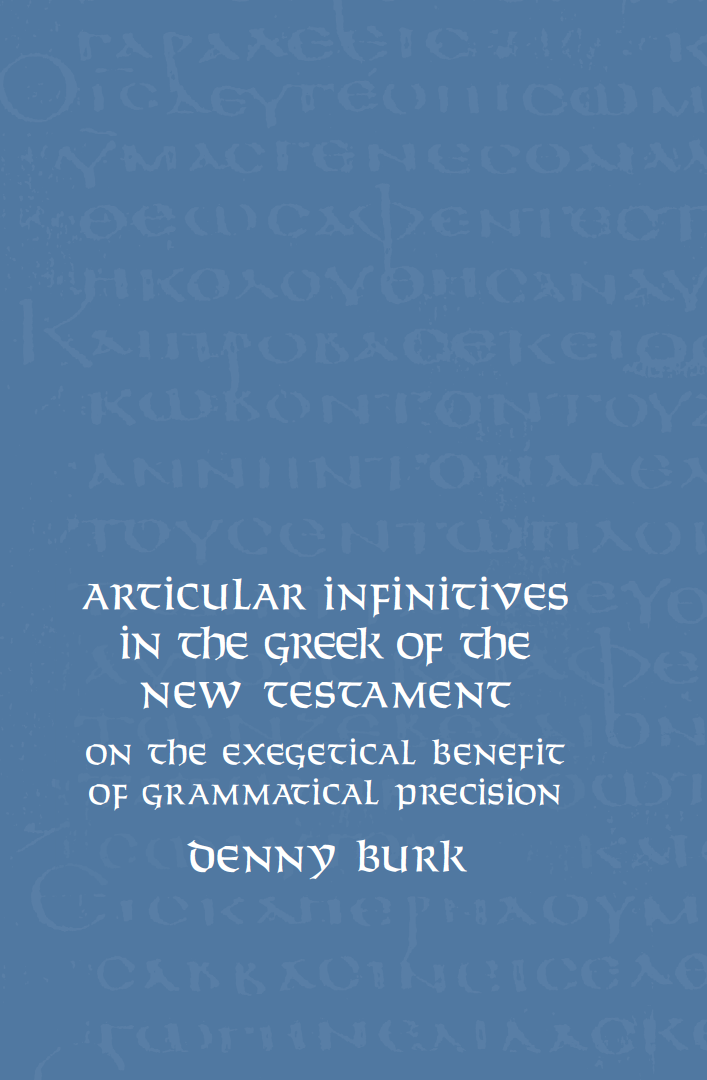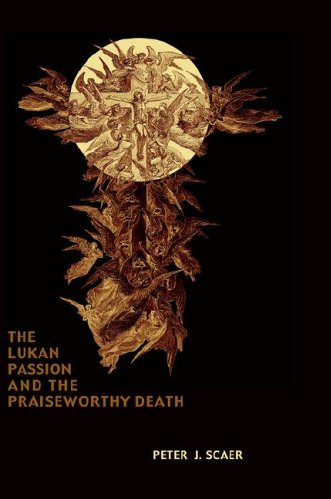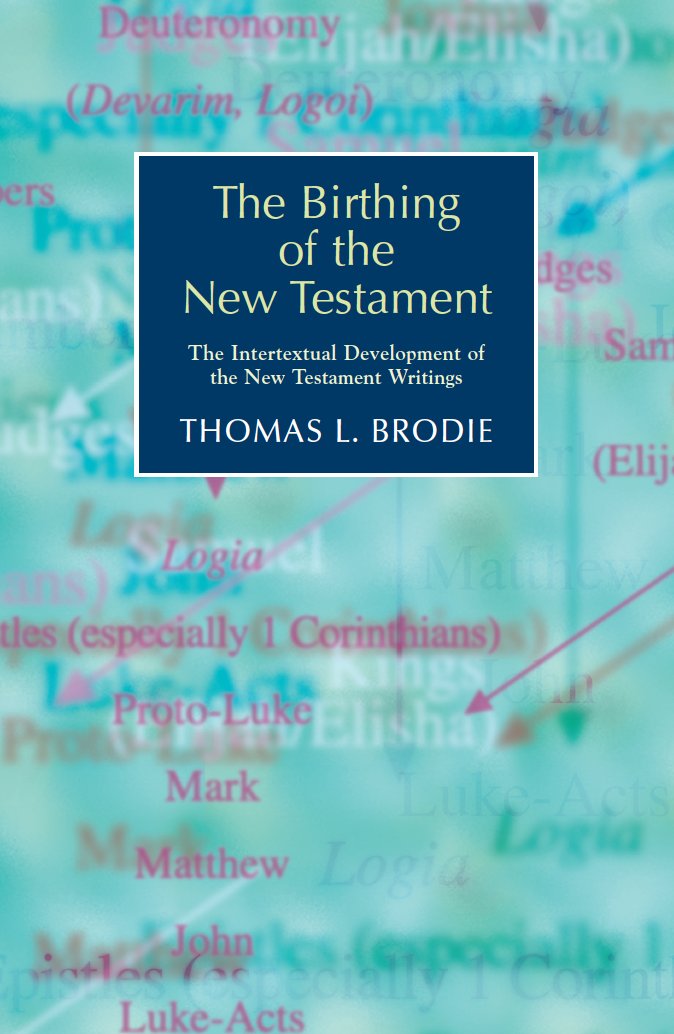Articular Infinitives in the Greek of the New Testament: On the Exegetical Benefit of Grammatical Precision
Published: Mar 2006
£35.00
Many New Testament scholars still operate under the mistaken notion that all of the problems of New Testament Greek grammar were worked out in the nineteenth century. This false assumption arises from an ignorance of developments in the field of modern linguistics.
In focusing on one significant aspect of grammar, the semantic and/or syntactic value of the articular infinitive, Burk undertakes to move beyond the standard New Testament grammar books. His question is: What does the article contribute to the total linguistic meaning of the infinitive in the Greek of the New Testament? To answer it he uses methods and results from modern linguistic analysis, an approach far different from that of traditional grammar.
Burk argues that the article with the infinitive is different from the article with other kinds of words. With other kinds of words the article encodes ideas such as definiteness, substantivization, and anaphora. The article with the infinitive, however, does not denote ideas such as these. With the infinitive the article is a function marker that signifies a grammatical-structural relation that may not otherwise be apparent. Discussing many examples from the New Testament, Burk shows his thesis has benefits not only for our understanding of Hellenistic Greek grammar, but also for our exegesis of the New Testament.
Articular Infinitives in the Greek of the New Testament: On the Exegetical Benefit of Grammatical Precision
£35.00
Many New Testament scholars still operate under the mistaken notion that all of the problems of New Testament Greek grammar were worked out in the nineteenth century. This false assumption arises from an ignorance of developments in the field of modern linguistics.
In focusing on one significant aspect of grammar, the semantic and/or syntactic value of the articular infinitive, Burk undertakes to move beyond the standard New Testament grammar books. His question is: What does the article contribute to the total linguistic meaning of the infinitive in the Greek of the New Testament? To answer it he uses methods and results from modern linguistic analysis, an approach far different from that of traditional grammar.
Burk argues that the article with the infinitive is different from the article with other kinds of words. With other kinds of words the article encodes ideas such as definiteness, substantivization, and anaphora. The article with the infinitive, however, does not denote ideas such as these. With the infinitive the article is a function marker that signifies a grammatical-structural relation that may not otherwise be apparent. Discussing many examples from the New Testament, Burk shows his thesis has benefits not only for our understanding of Hellenistic Greek grammar, but also for our exegesis of the New Testament.
Acts and Ethics
Published: Dec 2005
£50.00
This volume, the fruit of the sessions on the Book of Acts at the Annual Meeting of the Society of Biblical Literature, in San Antonio, Texas, in November 2004, contains these papers:
Stanley E. Porter, 'The Genre of Acts and the Ethics of Discourse'
Robert L. Brawley, 'Social Identity and the Aim of Accomplished Life in Acts 2'
F. Scott Spencer, 'Wise Up, Young Man: The Moral Vision of Saul and Other "Neaniskoi" in Acts'
Thomas E. Phillips, 'Paul as a Role Model in Acts: The "We"-Passages in Acts 16 and Beyond'
Richard P. Thompson, "What Do You Think You Are Doing, Paul?" Synagogues, Accusations, and Ethics in Paul's Ministry in Acts 16-21'
Matthew L. Skinner, 'Unchained Ministry: Paul's Roman Custody (Acts 21 —28) and the Sociopolitical Outlook of the Book of Acts'
C. Kavin Rowe, 'Authority and Community: Lukan Dominium in Acts'
Robert C. Tannehill, 'Do the Ethics of Acts Include the Ethical Teaching in Luke?'
Pamela Hedrick, 'The Good Samaritan, Cornelius, and the Just Use of Force'
Acts and Ethics
£50.00
This volume, the fruit of the sessions on the Book of Acts at the Annual Meeting of the Society of Biblical Literature, in San Antonio, Texas, in November 2004, contains these papers:
Stanley E. Porter, 'The Genre of Acts and the Ethics of Discourse'
Robert L. Brawley, 'Social Identity and the Aim of Accomplished Life in Acts 2'
F. Scott Spencer, 'Wise Up, Young Man: The Moral Vision of Saul and Other "Neaniskoi" in Acts'
Thomas E. Phillips, 'Paul as a Role Model in Acts: The "We"-Passages in Acts 16 and Beyond'
Richard P. Thompson, "What Do You Think You Are Doing, Paul?" Synagogues, Accusations, and Ethics in Paul's Ministry in Acts 16-21'
Matthew L. Skinner, 'Unchained Ministry: Paul's Roman Custody (Acts 21 —28) and the Sociopolitical Outlook of the Book of Acts'
C. Kavin Rowe, 'Authority and Community: Lukan Dominium in Acts'
Robert C. Tannehill, 'Do the Ethics of Acts Include the Ethical Teaching in Luke?'
Pamela Hedrick, 'The Good Samaritan, Cornelius, and the Just Use of Force'
The Lukan Passion and the Praiseworthy Death
Published: Oct 2005
£40.00
In the ancient world, crucifixion epitomized all that was shameful, servile and lowly. Jesus' death on a cross would have been a stumbling block for many. Luke recognized this prevailing attitude toward crucifixion, and sought to show that Jesus' death was noble and praiseworthy, even according to the Roman world's own standards.
Scaer argues that Luke drew upon the Noble Death tradition, especially as found in Graeco-Roman rhetoric, in depicting Jesus as a man of courage and virtue. Luke also made use of Jewish-Hellenistic martyrological traditions to present Jesus' death as worthy not only of honour, but even of emulation. Most provocatively, Scaer contends that the third evangelist drew specific motifs from the Socrates story in order to show that the founder of the new Christian movement was a noble and just man, deserving of the utmost respect.
In using these Graeco-Roman sources as he fashioned his narrative of Jesus' death, Luke reveals himself as a masterful author in the classical tradition, intent on portraying Christianity as a world class religion.
The Lukan Passion and the Praiseworthy Death
£40.00
In the ancient world, crucifixion epitomized all that was shameful, servile and lowly. Jesus' death on a cross would have been a stumbling block for many. Luke recognized this prevailing attitude toward crucifixion, and sought to show that Jesus' death was noble and praiseworthy, even according to the Roman world's own standards.
Scaer argues that Luke drew upon the Noble Death tradition, especially as found in Graeco-Roman rhetoric, in depicting Jesus as a man of courage and virtue. Luke also made use of Jewish-Hellenistic martyrological traditions to present Jesus' death as worthy not only of honour, but even of emulation. Most provocatively, Scaer contends that the third evangelist drew specific motifs from the Socrates story in order to show that the founder of the new Christian movement was a noble and just man, deserving of the utmost respect.
In using these Graeco-Roman sources as he fashioned his narrative of Jesus' death, Luke reveals himself as a masterful author in the classical tradition, intent on portraying Christianity as a world class religion.
Entertaining Angels: Early Christian Hospitality in Its Mediterranean Setting
Published: Jan 2005
£55.00
Hospitality in the ancient Mediterranean world was not a matter of entertaining one's neighbours to dinner. And among the early Christians it was not the same as table-fellowship either, though most modern works confuse that with hospitality. Hospitality was essentially the provision of food and protection for travellers; it could include also a bath, supplies for the traveller's onward journey, and an escort along the road toward to the traveller's next destination.
Unlike other writers, Arterbury combs through a broad spectrum of Greek, Roman and Jewish texts -- as well as early Christian texts outside the New Testament -- for literary depictions of the custom of hospitality. As well, he brings into the picture the Greek novels, which provide us with vivid insights into ancient Mediterranean life. His book presents the most complete analysis of the terms used for hospitality. And he shows how important the practice of hospitality is in understanding the narrative of the conversion of the Gentile Cornelius in Acts 10-11: Luke is here suggesting that Christian communities should employ the traditional custom of hospitality as an effective means of bridging the cultural divide between Jews and Gentiles, evangelizing unbelievers, and forging bonds of friendship with strangers.
This revealing and engaging example of what Arterbury describes as 'historical audience-oriented criticism' will be appreciated by scholars and students interested in the reality of life in New Testament times.
Entertaining Angels: Early Christian Hospitality in Its Mediterranean Setting
£55.00
Hospitality in the ancient Mediterranean world was not a matter of entertaining one's neighbours to dinner. And among the early Christians it was not the same as table-fellowship either, though most modern works confuse that with hospitality. Hospitality was essentially the provision of food and protection for travellers; it could include also a bath, supplies for the traveller's onward journey, and an escort along the road toward to the traveller's next destination.
Unlike other writers, Arterbury combs through a broad spectrum of Greek, Roman and Jewish texts -- as well as early Christian texts outside the New Testament -- for literary depictions of the custom of hospitality. As well, he brings into the picture the Greek novels, which provide us with vivid insights into ancient Mediterranean life. His book presents the most complete analysis of the terms used for hospitality. And he shows how important the practice of hospitality is in understanding the narrative of the conversion of the Gentile Cornelius in Acts 10-11: Luke is here suggesting that Christian communities should employ the traditional custom of hospitality as an effective means of bridging the cultural divide between Jews and Gentiles, evangelizing unbelievers, and forging bonds of friendship with strangers.
This revealing and engaging example of what Arterbury describes as 'historical audience-oriented criticism' will be appreciated by scholars and students interested in the reality of life in New Testament times.
Corpus Linguistics and the Greek of the New Testament
Published: Jan 2005
£70.00
The burgeoning field of corpus linguistics studies aspects of a language that are susceptible to computer processing once a sizable electronic corpus of the language has been assembled. In this groundbreaking work, O'Donnell takes the unusual step of applying the techniques of corpus linguistics to Hellenistic Greek and especially the Greek of the New Testament, and in three areas shows, with a multitude of worked examples, how it could sharpen our appreciation of the language.
First, in New Testament textual criticism decisions for a preferred reading would be better founded if all analogous data in all the manuscript traditions were available. And in source criticism, where statistical methods have already been applied, more advanced statistical and graphical techniques, including dotplot, can now be exploited.
The second application of corpus linguistics is to lexicography, where, for example, collocational analysis of a corpus of texts leads to sharper definition of synonyms; the case of the pair egeiro and anistemi ('raise'), considered in detail, proves the point.
Thirdly, corpus-based techniques can be applied to discourse analysis. Here O'Donnell fine-tunes —by means of a subtle discourse annotation model —answers that may be given to questions about the situation and purpose of the letters of Jude and of Paul to Philemon. This book, though technical in many parts, opens up a new field to many biblical scholars, who may be surprised to discover how much they still have to learn about the Greek of the New Testament.
Corpus Linguistics and the Greek of the New Testament
£70.00
The burgeoning field of corpus linguistics studies aspects of a language that are susceptible to computer processing once a sizable electronic corpus of the language has been assembled. In this groundbreaking work, O'Donnell takes the unusual step of applying the techniques of corpus linguistics to Hellenistic Greek and especially the Greek of the New Testament, and in three areas shows, with a multitude of worked examples, how it could sharpen our appreciation of the language.
First, in New Testament textual criticism decisions for a preferred reading would be better founded if all analogous data in all the manuscript traditions were available. And in source criticism, where statistical methods have already been applied, more advanced statistical and graphical techniques, including dotplot, can now be exploited.
The second application of corpus linguistics is to lexicography, where, for example, collocational analysis of a corpus of texts leads to sharper definition of synonyms; the case of the pair egeiro and anistemi ('raise'), considered in detail, proves the point.
Thirdly, corpus-based techniques can be applied to discourse analysis. Here O'Donnell fine-tunes —by means of a subtle discourse annotation model —answers that may be given to questions about the situation and purpose of the letters of Jude and of Paul to Philemon. This book, though technical in many parts, opens up a new field to many biblical scholars, who may be surprised to discover how much they still have to learn about the Greek of the New Testament.
The Birthing of the New Testament: The Intertextual Development of the New Testament Writings
Published: Nov 2004
£22.50
Many are saying that the prevailing paradigm of New Testament origins is going nowhere. In its place, Brodie’s stunning book invites us to suspend all ‘knowledge’ we already have about the history of the New Testament’s development, and to be willing to entertain the following thesis.
Everything hinges on Proto-Luke, a history of Jesus using the Elijah–Elisha narrative as its model, which survives in 10 chapters of Luke and 15 of Acts. Mark then uses Proto-Luke, transposing its Acts material back into the life of Jesus. Matthew deuteronomizes Mark, John improves on the discourses of Matthew. Luke–Acts spells out the story at length. Add the Pauline corpus, the descendant of Deuteronomy via the Matthean logia, and the New Testament is virtually complete.
This is a totalizing theory, an explanation of everything, and its critics will be numerous. But even they will be hugely intrigued, and have to admit that Brodie’s myriads of challenging observations about literary affinities demand an answer.
The Birthing of the New Testament: The Intertextual Development of the New Testament Writings
£22.50
Many are saying that the prevailing paradigm of New Testament origins is going nowhere. In its place, Brodie’s stunning book invites us to suspend all ‘knowledge’ we already have about the history of the New Testament’s development, and to be willing to entertain the following thesis.
Everything hinges on Proto-Luke, a history of Jesus using the Elijah–Elisha narrative as its model, which survives in 10 chapters of Luke and 15 of Acts. Mark then uses Proto-Luke, transposing its Acts material back into the life of Jesus. Matthew deuteronomizes Mark, John improves on the discourses of Matthew. Luke–Acts spells out the story at length. Add the Pauline corpus, the descendant of Deuteronomy via the Matthean logia, and the New Testament is virtually complete.
This is a totalizing theory, an explanation of everything, and its critics will be numerous. But even they will be hugely intrigued, and have to admit that Brodie’s myriads of challenging observations about literary affinities demand an answer.






